Economic Analysis: Factors Influencing UK Private Housing Market
VerifiedAdded on 2023/01/13
|10
|3013
|43
Report
AI Summary
This report provides an analysis of the UK's private housing market, examining the key factors influencing supply and demand, and their impact on housing prices. It identifies population growth, interest rates, income effects, taxation policies, and rental costs as primary drivers of demand and price fluctuations. The report also explores governmental and economic policies, such as affordable housing initiatives, Brexit implications, and planning permissions related to green belt land, that are used to influence the demand for private rental housing. The study uses economic principles like the laws of supply and demand, illustrated with graphs, to explain market dynamics and concludes by summarizing the interplay of these factors in shaping the UK's private housing sector.
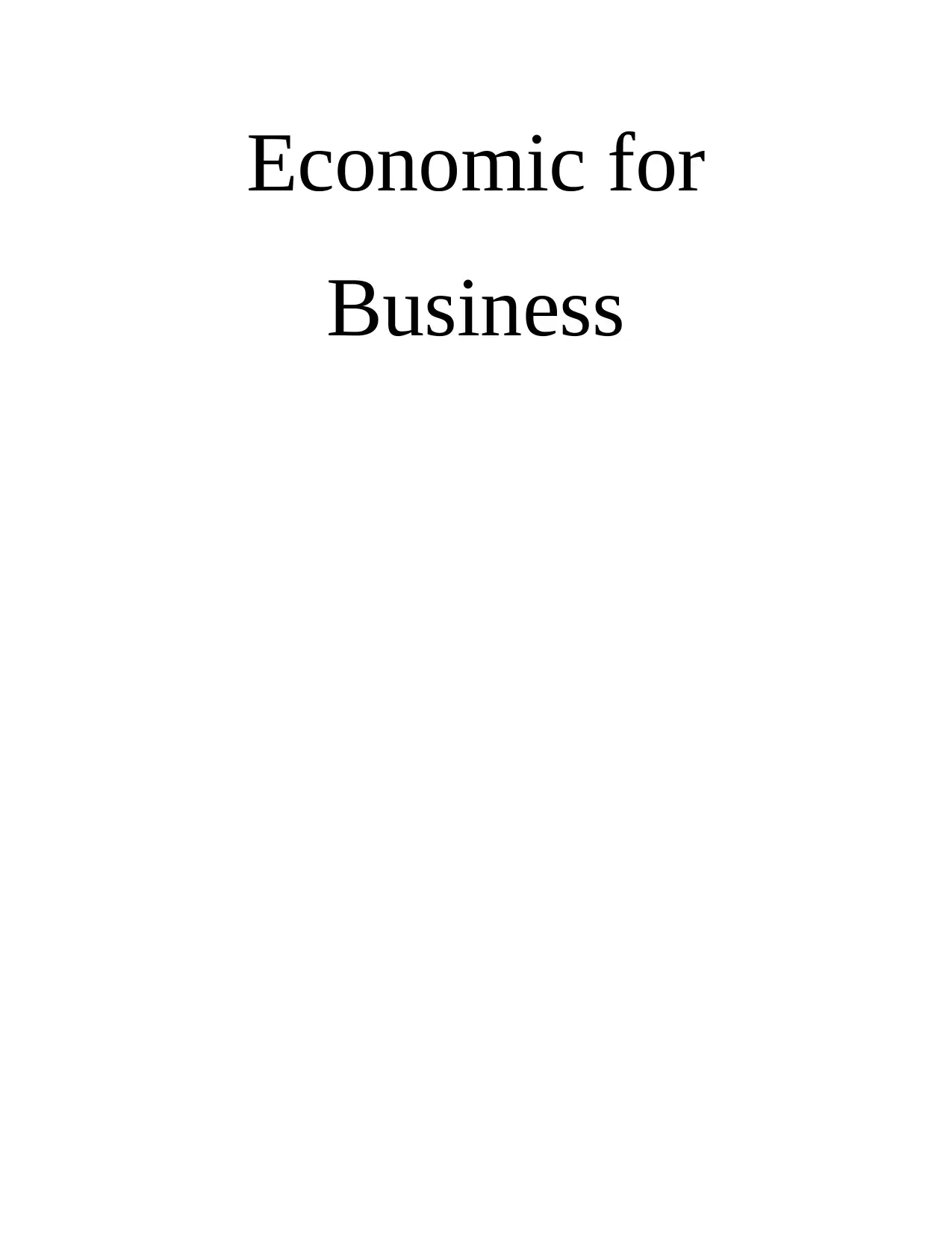
Economic for
Business
Business
Paraphrase This Document
Need a fresh take? Get an instant paraphrase of this document with our AI Paraphraser
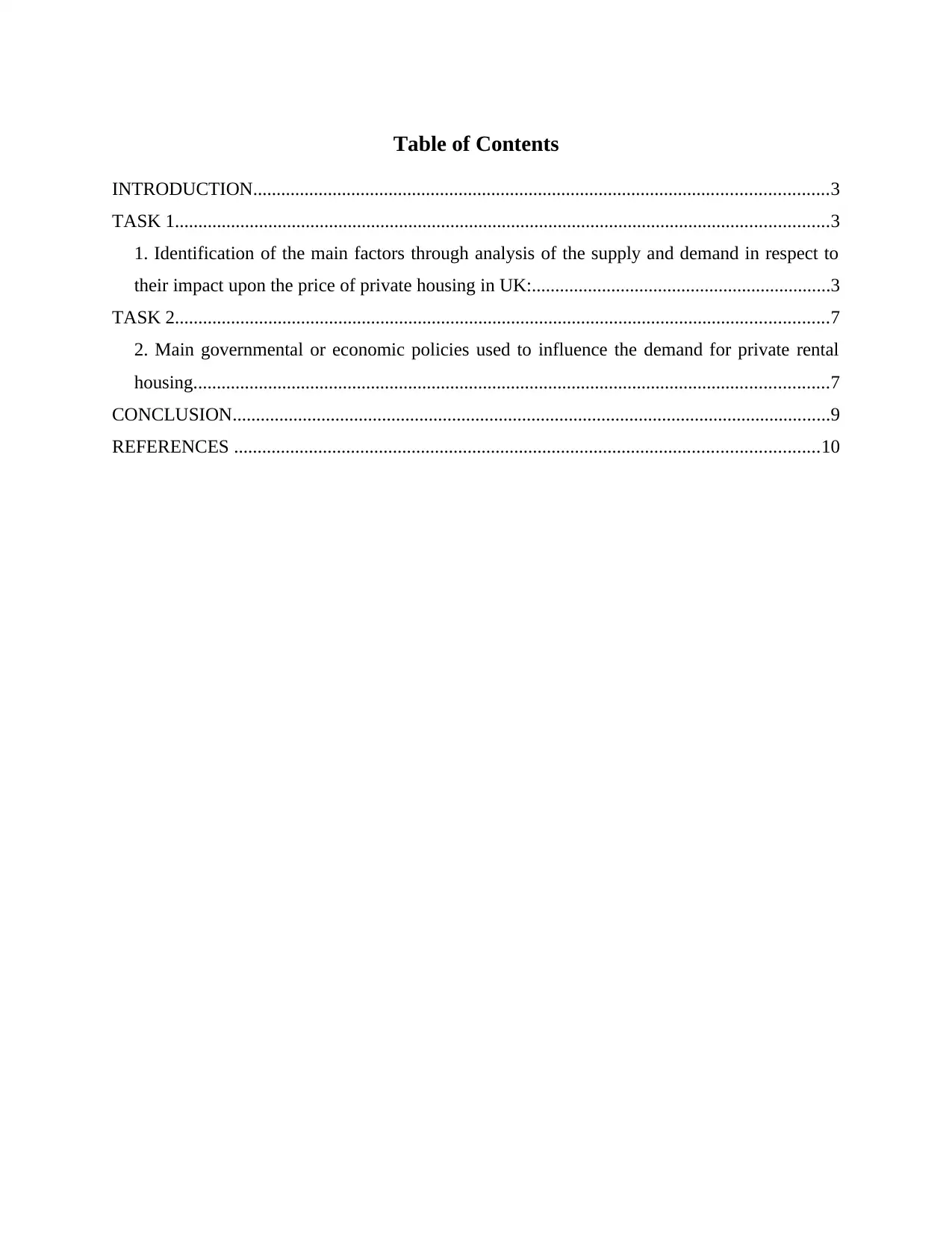
Table of Contents
INTRODUCTION...........................................................................................................................3
TASK 1............................................................................................................................................3
1. Identification of the main factors through analysis of the supply and demand in respect to
their impact upon the price of private housing in UK:................................................................3
TASK 2............................................................................................................................................7
2. Main governmental or economic policies used to influence the demand for private rental
housing........................................................................................................................................7
CONCLUSION................................................................................................................................9
REFERENCES .............................................................................................................................10
INTRODUCTION...........................................................................................................................3
TASK 1............................................................................................................................................3
1. Identification of the main factors through analysis of the supply and demand in respect to
their impact upon the price of private housing in UK:................................................................3
TASK 2............................................................................................................................................7
2. Main governmental or economic policies used to influence the demand for private rental
housing........................................................................................................................................7
CONCLUSION................................................................................................................................9
REFERENCES .............................................................................................................................10
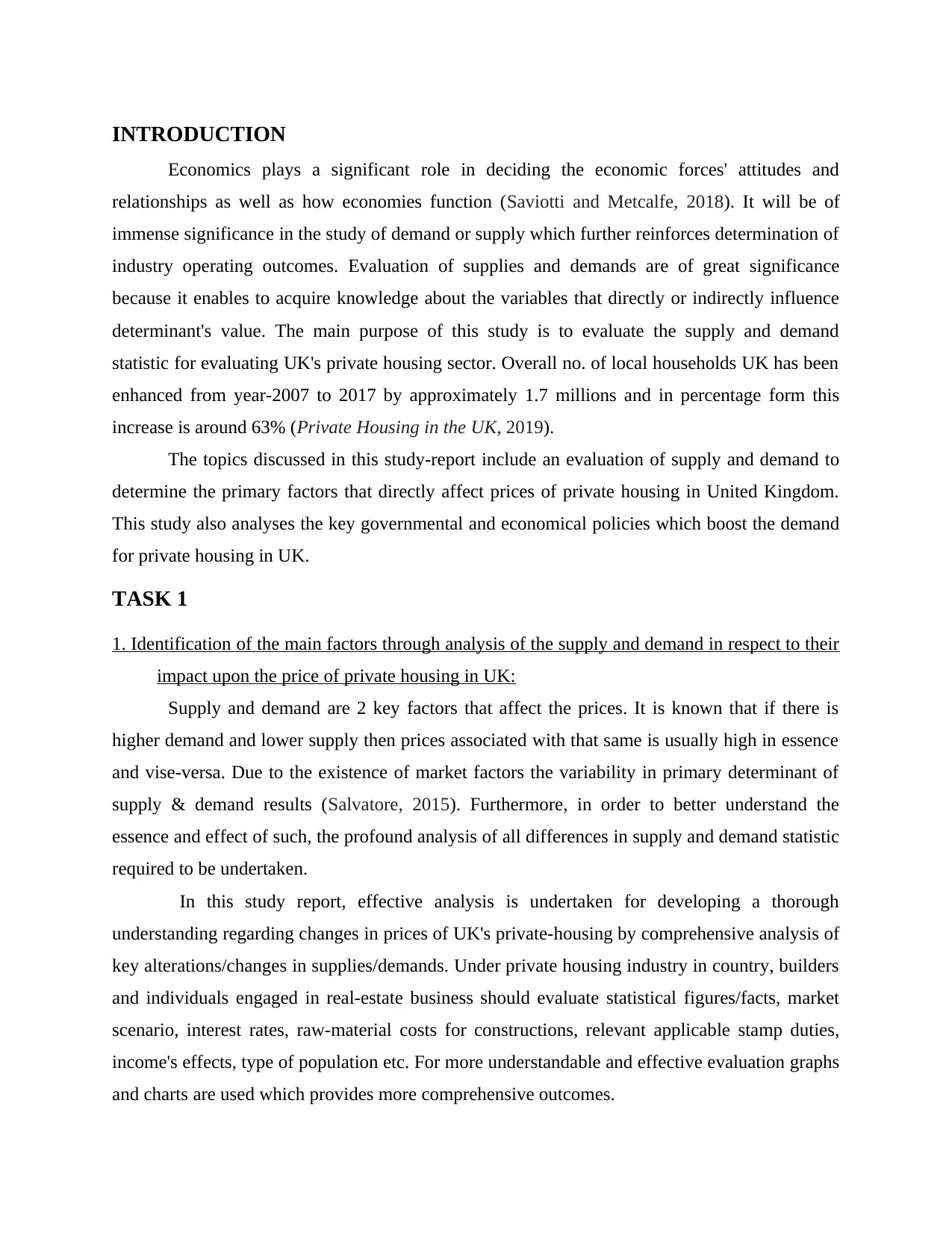
INTRODUCTION
Economics plays a significant role in deciding the economic forces' attitudes and
relationships as well as how economies function (Saviotti and Metcalfe, 2018). It will be of
immense significance in the study of demand or supply which further reinforces determination of
industry operating outcomes. Evaluation of supplies and demands are of great significance
because it enables to acquire knowledge about the variables that directly or indirectly influence
determinant's value. The main purpose of this study is to evaluate the supply and demand
statistic for evaluating UK's private housing sector. Overall no. of local households UK has been
enhanced from year-2007 to 2017 by approximately 1.7 millions and in percentage form this
increase is around 63% (Private Housing in the UK, 2019).
The topics discussed in this study-report include an evaluation of supply and demand to
determine the primary factors that directly affect prices of private housing in United Kingdom.
This study also analyses the key governmental and economical policies which boost the demand
for private housing in UK.
TASK 1
1. Identification of the main factors through analysis of the supply and demand in respect to their
impact upon the price of private housing in UK:
Supply and demand are 2 key factors that affect the prices. It is known that if there is
higher demand and lower supply then prices associated with that same is usually high in essence
and vise-versa. Due to the existence of market factors the variability in primary determinant of
supply & demand results (Salvatore, 2015). Furthermore, in order to better understand the
essence and effect of such, the profound analysis of all differences in supply and demand statistic
required to be undertaken.
In this study report, effective analysis is undertaken for developing a thorough
understanding regarding changes in prices of UK's private-housing by comprehensive analysis of
key alterations/changes in supplies/demands. Under private housing industry in country, builders
and individuals engaged in real-estate business should evaluate statistical figures/facts, market
scenario, interest rates, raw-material costs for constructions, relevant applicable stamp duties,
income's effects, type of population etc. For more understandable and effective evaluation graphs
and charts are used which provides more comprehensive outcomes.
Economics plays a significant role in deciding the economic forces' attitudes and
relationships as well as how economies function (Saviotti and Metcalfe, 2018). It will be of
immense significance in the study of demand or supply which further reinforces determination of
industry operating outcomes. Evaluation of supplies and demands are of great significance
because it enables to acquire knowledge about the variables that directly or indirectly influence
determinant's value. The main purpose of this study is to evaluate the supply and demand
statistic for evaluating UK's private housing sector. Overall no. of local households UK has been
enhanced from year-2007 to 2017 by approximately 1.7 millions and in percentage form this
increase is around 63% (Private Housing in the UK, 2019).
The topics discussed in this study-report include an evaluation of supply and demand to
determine the primary factors that directly affect prices of private housing in United Kingdom.
This study also analyses the key governmental and economical policies which boost the demand
for private housing in UK.
TASK 1
1. Identification of the main factors through analysis of the supply and demand in respect to their
impact upon the price of private housing in UK:
Supply and demand are 2 key factors that affect the prices. It is known that if there is
higher demand and lower supply then prices associated with that same is usually high in essence
and vise-versa. Due to the existence of market factors the variability in primary determinant of
supply & demand results (Salvatore, 2015). Furthermore, in order to better understand the
essence and effect of such, the profound analysis of all differences in supply and demand statistic
required to be undertaken.
In this study report, effective analysis is undertaken for developing a thorough
understanding regarding changes in prices of UK's private-housing by comprehensive analysis of
key alterations/changes in supplies/demands. Under private housing industry in country, builders
and individuals engaged in real-estate business should evaluate statistical figures/facts, market
scenario, interest rates, raw-material costs for constructions, relevant applicable stamp duties,
income's effects, type of population etc. For more understandable and effective evaluation graphs
and charts are used which provides more comprehensive outcomes.
⊘ This is a preview!⊘
Do you want full access?
Subscribe today to unlock all pages.

Trusted by 1+ million students worldwide
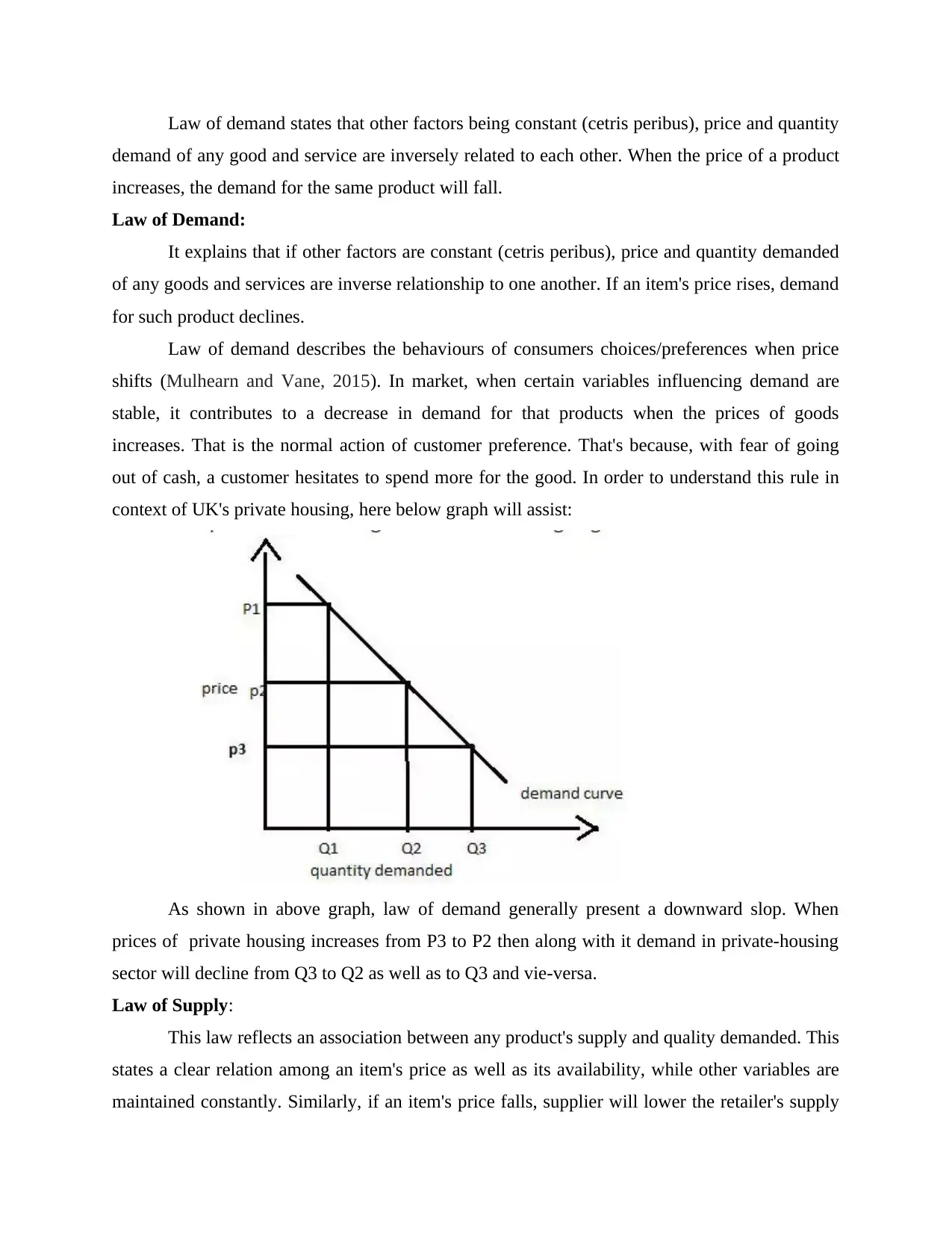
Law of demand states that other factors being constant (cetris peribus), price and quantity
demand of any good and service are inversely related to each other. When the price of a product
increases, the demand for the same product will fall.
Law of Demand:
It explains that if other factors are constant (cetris peribus), price and quantity demanded
of any goods and services are inverse relationship to one another. If an item's price rises, demand
for such product declines.
Law of demand describes the behaviours of consumers choices/preferences when price
shifts (Mulhearn and Vane, 2015). In market, when certain variables influencing demand are
stable, it contributes to a decrease in demand for that products when the prices of goods
increases. That is the normal action of customer preference. That's because, with fear of going
out of cash, a customer hesitates to spend more for the good. In order to understand this rule in
context of UK's private housing, here below graph will assist:
As shown in above graph, law of demand generally present a downward slop. When
prices of private housing increases from P3 to P2 then along with it demand in private-housing
sector will decline from Q3 to Q2 as well as to Q3 and vie-versa.
Law of Supply:
This law reflects an association between any product's supply and quality demanded. This
states a clear relation among an item's price as well as its availability, while other variables are
maintained constantly. Similarly, if an item's price falls, supplier will lower the retailer's supply
demand of any good and service are inversely related to each other. When the price of a product
increases, the demand for the same product will fall.
Law of Demand:
It explains that if other factors are constant (cetris peribus), price and quantity demanded
of any goods and services are inverse relationship to one another. If an item's price rises, demand
for such product declines.
Law of demand describes the behaviours of consumers choices/preferences when price
shifts (Mulhearn and Vane, 2015). In market, when certain variables influencing demand are
stable, it contributes to a decrease in demand for that products when the prices of goods
increases. That is the normal action of customer preference. That's because, with fear of going
out of cash, a customer hesitates to spend more for the good. In order to understand this rule in
context of UK's private housing, here below graph will assist:
As shown in above graph, law of demand generally present a downward slop. When
prices of private housing increases from P3 to P2 then along with it demand in private-housing
sector will decline from Q3 to Q2 as well as to Q3 and vie-versa.
Law of Supply:
This law reflects an association between any product's supply and quality demanded. This
states a clear relation among an item's price as well as its availability, while other variables are
maintained constantly. Similarly, if an item's price falls, supplier will lower the retailer's supply
Paraphrase This Document
Need a fresh take? Get an instant paraphrase of this document with our AI Paraphraser
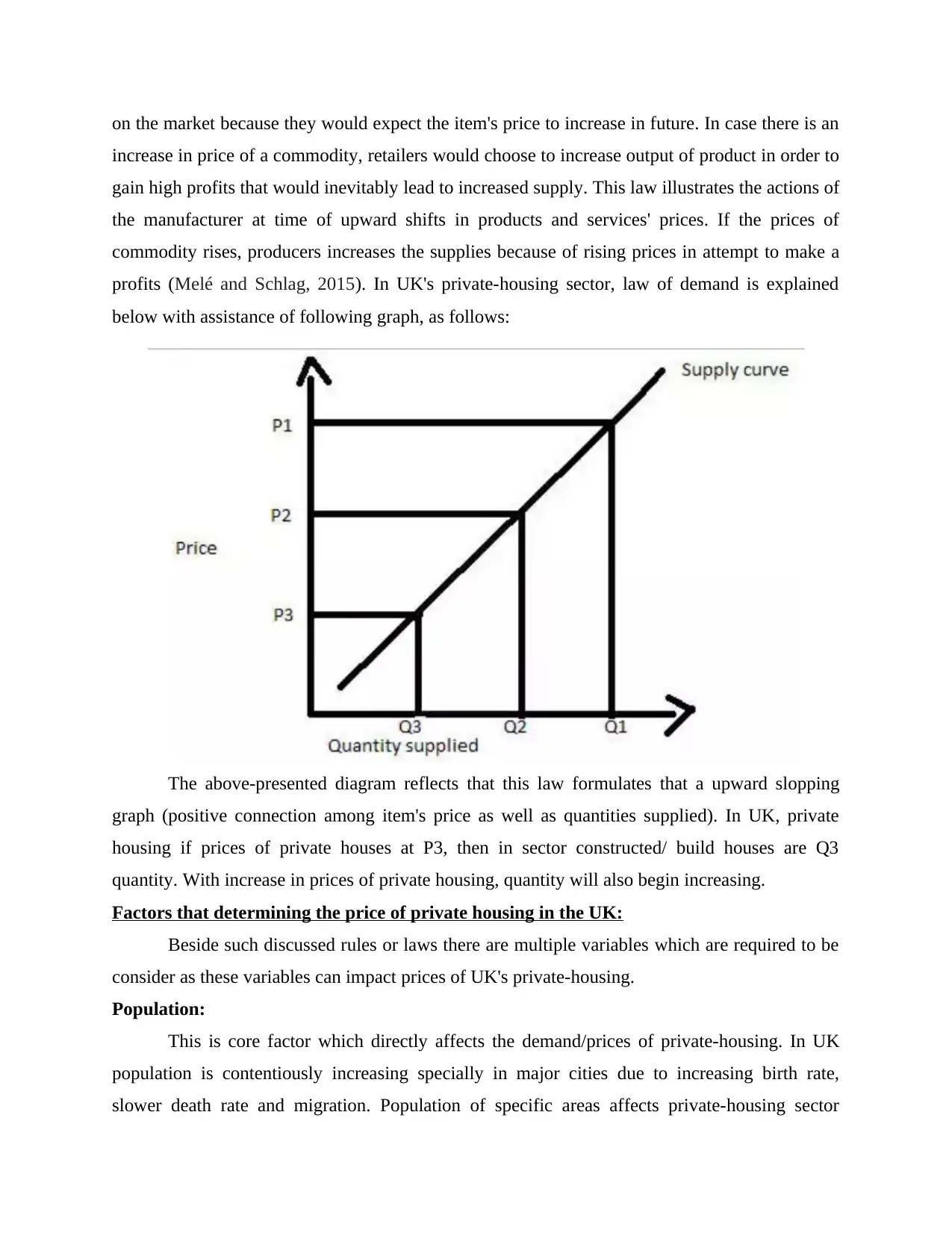
on the market because they would expect the item's price to increase in future. In case there is an
increase in price of a commodity, retailers would choose to increase output of product in order to
gain high profits that would inevitably lead to increased supply. This law illustrates the actions of
the manufacturer at time of upward shifts in products and services' prices. If the prices of
commodity rises, producers increases the supplies because of rising prices in attempt to make a
profits (Melé and Schlag, 2015). In UK's private-housing sector, law of demand is explained
below with assistance of following graph, as follows:
The above-presented diagram reflects that this law formulates that a upward slopping
graph (positive connection among item's price as well as quantities supplied). In UK, private
housing if prices of private houses at P3, then in sector constructed/ build houses are Q3
quantity. With increase in prices of private housing, quantity will also begin increasing.
Factors that determining the price of private housing in the UK:
Beside such discussed rules or laws there are multiple variables which are required to be
consider as these variables can impact prices of UK's private-housing.
Population:
This is core factor which directly affects the demand/prices of private-housing. In UK
population is contentiously increasing specially in major cities due to increasing birth rate,
slower death rate and migration. Population of specific areas affects private-housing sector
increase in price of a commodity, retailers would choose to increase output of product in order to
gain high profits that would inevitably lead to increased supply. This law illustrates the actions of
the manufacturer at time of upward shifts in products and services' prices. If the prices of
commodity rises, producers increases the supplies because of rising prices in attempt to make a
profits (Melé and Schlag, 2015). In UK's private-housing sector, law of demand is explained
below with assistance of following graph, as follows:
The above-presented diagram reflects that this law formulates that a upward slopping
graph (positive connection among item's price as well as quantities supplied). In UK, private
housing if prices of private houses at P3, then in sector constructed/ build houses are Q3
quantity. With increase in prices of private housing, quantity will also begin increasing.
Factors that determining the price of private housing in the UK:
Beside such discussed rules or laws there are multiple variables which are required to be
consider as these variables can impact prices of UK's private-housing.
Population:
This is core factor which directly affects the demand/prices of private-housing. In UK
population is contentiously increasing specially in major cities due to increasing birth rate,
slower death rate and migration. Population of specific areas affects private-housing sector
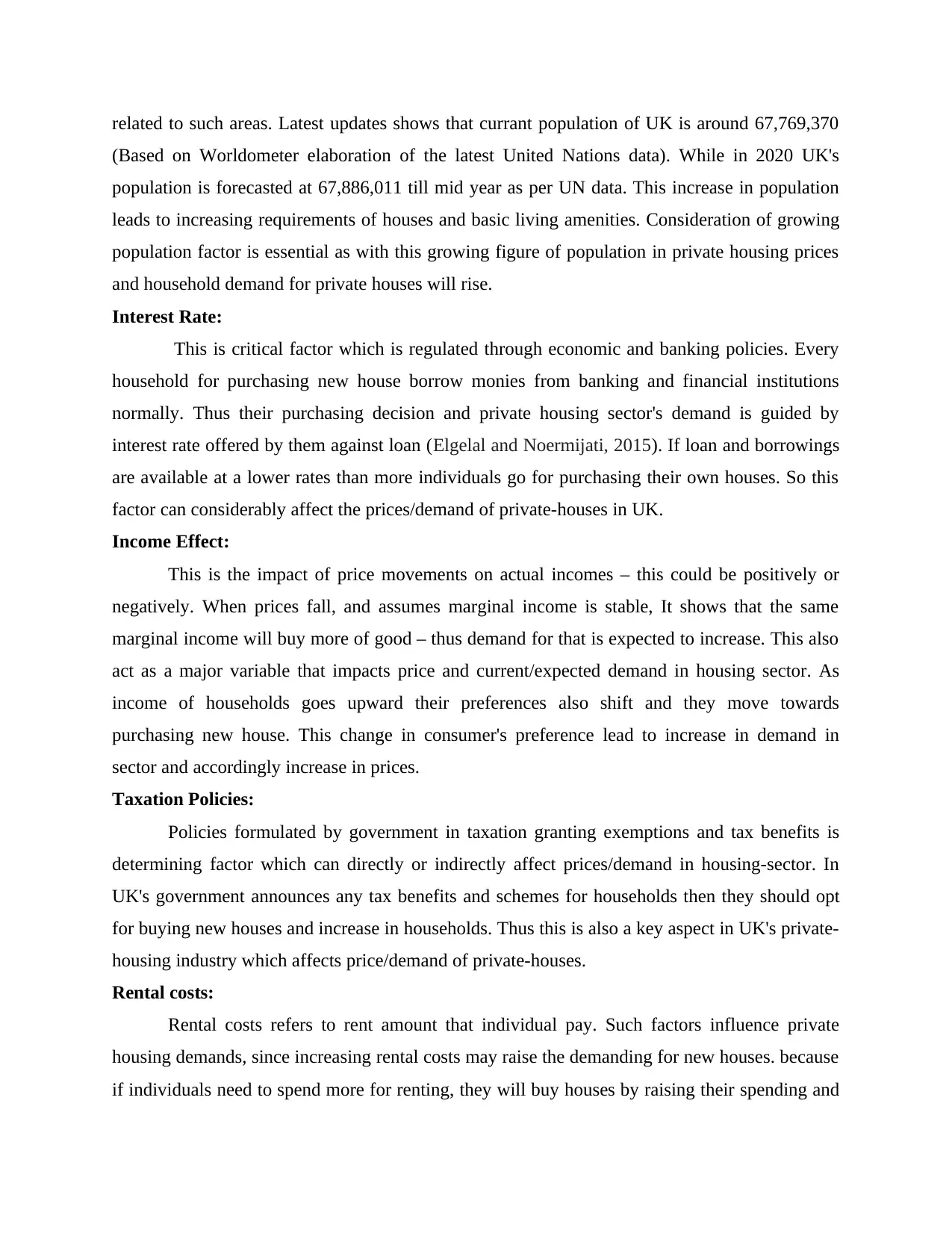
related to such areas. Latest updates shows that currant population of UK is around 67,769,370
(Based on Worldometer elaboration of the latest United Nations data). While in 2020 UK's
population is forecasted at 67,886,011 till mid year as per UN data. This increase in population
leads to increasing requirements of houses and basic living amenities. Consideration of growing
population factor is essential as with this growing figure of population in private housing prices
and household demand for private houses will rise.
Interest Rate:
This is critical factor which is regulated through economic and banking policies. Every
household for purchasing new house borrow monies from banking and financial institutions
normally. Thus their purchasing decision and private housing sector's demand is guided by
interest rate offered by them against loan (Elgelal and Noermijati, 2015). If loan and borrowings
are available at a lower rates than more individuals go for purchasing their own houses. So this
factor can considerably affect the prices/demand of private-houses in UK.
Income Effect:
This is the impact of price movements on actual incomes – this could be positively or
negatively. When prices fall, and assumes marginal income is stable, It shows that the same
marginal income will buy more of good – thus demand for that is expected to increase. This also
act as a major variable that impacts price and current/expected demand in housing sector. As
income of households goes upward their preferences also shift and they move towards
purchasing new house. This change in consumer's preference lead to increase in demand in
sector and accordingly increase in prices.
Taxation Policies:
Policies formulated by government in taxation granting exemptions and tax benefits is
determining factor which can directly or indirectly affect prices/demand in housing-sector. In
UK's government announces any tax benefits and schemes for households then they should opt
for buying new houses and increase in households. Thus this is also a key aspect in UK's private-
housing industry which affects price/demand of private-houses.
Rental costs:
Rental costs refers to rent amount that individual pay. Such factors influence private
housing demands, since increasing rental costs may raise the demanding for new houses. because
if individuals need to spend more for renting, they will buy houses by raising their spending and
(Based on Worldometer elaboration of the latest United Nations data). While in 2020 UK's
population is forecasted at 67,886,011 till mid year as per UN data. This increase in population
leads to increasing requirements of houses and basic living amenities. Consideration of growing
population factor is essential as with this growing figure of population in private housing prices
and household demand for private houses will rise.
Interest Rate:
This is critical factor which is regulated through economic and banking policies. Every
household for purchasing new house borrow monies from banking and financial institutions
normally. Thus their purchasing decision and private housing sector's demand is guided by
interest rate offered by them against loan (Elgelal and Noermijati, 2015). If loan and borrowings
are available at a lower rates than more individuals go for purchasing their own houses. So this
factor can considerably affect the prices/demand of private-houses in UK.
Income Effect:
This is the impact of price movements on actual incomes – this could be positively or
negatively. When prices fall, and assumes marginal income is stable, It shows that the same
marginal income will buy more of good – thus demand for that is expected to increase. This also
act as a major variable that impacts price and current/expected demand in housing sector. As
income of households goes upward their preferences also shift and they move towards
purchasing new house. This change in consumer's preference lead to increase in demand in
sector and accordingly increase in prices.
Taxation Policies:
Policies formulated by government in taxation granting exemptions and tax benefits is
determining factor which can directly or indirectly affect prices/demand in housing-sector. In
UK's government announces any tax benefits and schemes for households then they should opt
for buying new houses and increase in households. Thus this is also a key aspect in UK's private-
housing industry which affects price/demand of private-houses.
Rental costs:
Rental costs refers to rent amount that individual pay. Such factors influence private
housing demands, since increasing rental costs may raise the demanding for new houses. because
if individuals need to spend more for renting, they will buy houses by raising their spending and
⊘ This is a preview!⊘
Do you want full access?
Subscribe today to unlock all pages.

Trusted by 1+ million students worldwide
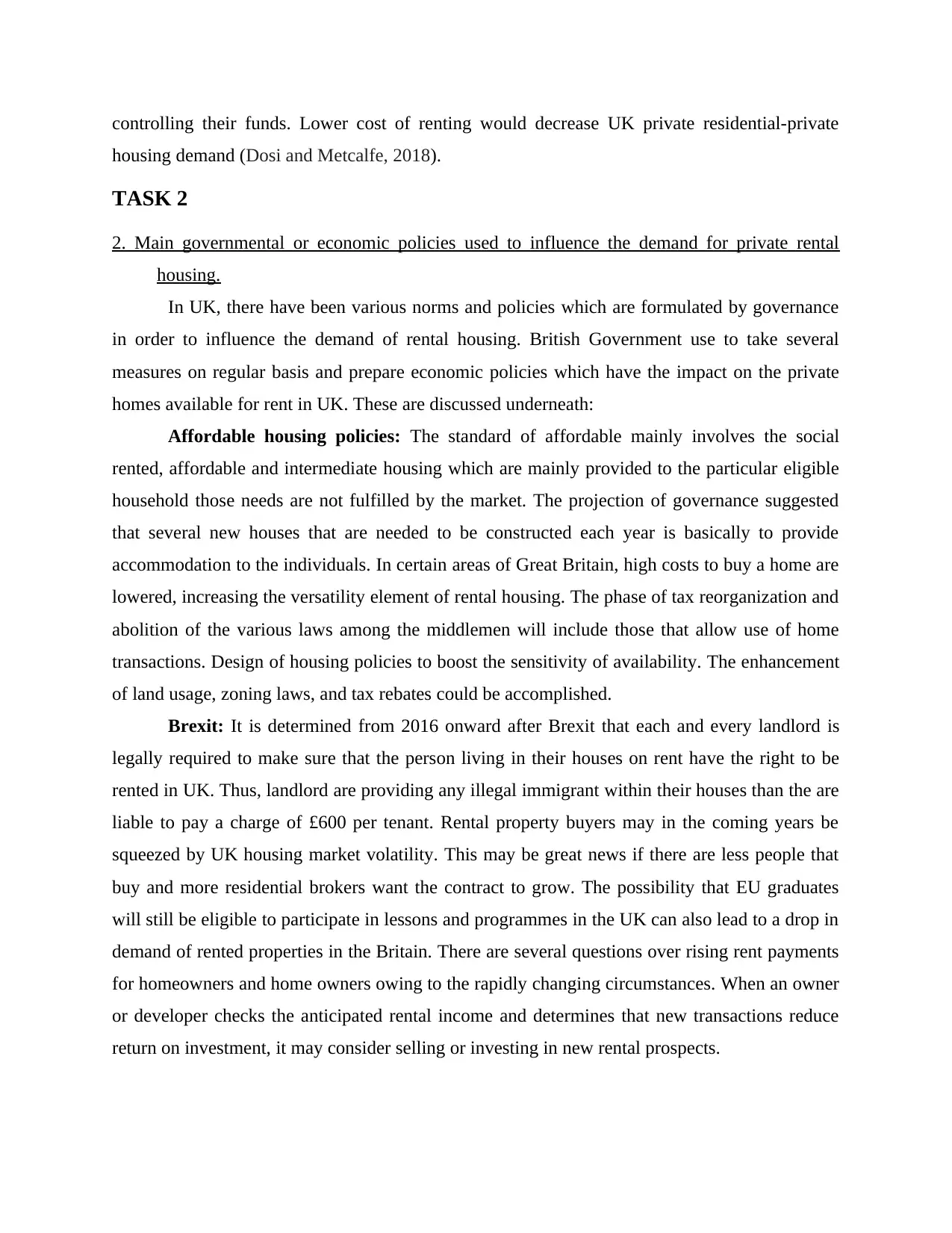
controlling their funds. Lower cost of renting would decrease UK private residential-private
housing demand (Dosi and Metcalfe, 2018).
TASK 2
2. Main governmental or economic policies used to influence the demand for private rental
housing.
In UK, there have been various norms and policies which are formulated by governance
in order to influence the demand of rental housing. British Government use to take several
measures on regular basis and prepare economic policies which have the impact on the private
homes available for rent in UK. These are discussed underneath:
Affordable housing policies: The standard of affordable mainly involves the social
rented, affordable and intermediate housing which are mainly provided to the particular eligible
household those needs are not fulfilled by the market. The projection of governance suggested
that several new houses that are needed to be constructed each year is basically to provide
accommodation to the individuals. In certain areas of Great Britain, high costs to buy a home are
lowered, increasing the versatility element of rental housing. The phase of tax reorganization and
abolition of the various laws among the middlemen will include those that allow use of home
transactions. Design of housing policies to boost the sensitivity of availability. The enhancement
of land usage, zoning laws, and tax rebates could be accomplished.
Brexit: It is determined from 2016 onward after Brexit that each and every landlord is
legally required to make sure that the person living in their houses on rent have the right to be
rented in UK. Thus, landlord are providing any illegal immigrant within their houses than the are
liable to pay a charge of £600 per tenant. Rental property buyers may in the coming years be
squeezed by UK housing market volatility. This may be great news if there are less people that
buy and more residential brokers want the contract to grow. The possibility that EU graduates
will still be eligible to participate in lessons and programmes in the UK can also lead to a drop in
demand of rented properties in the Britain. There are several questions over rising rent payments
for homeowners and home owners owing to the rapidly changing circumstances. When an owner
or developer checks the anticipated rental income and determines that new transactions reduce
return on investment, it may consider selling or investing in new rental prospects.
housing demand (Dosi and Metcalfe, 2018).
TASK 2
2. Main governmental or economic policies used to influence the demand for private rental
housing.
In UK, there have been various norms and policies which are formulated by governance
in order to influence the demand of rental housing. British Government use to take several
measures on regular basis and prepare economic policies which have the impact on the private
homes available for rent in UK. These are discussed underneath:
Affordable housing policies: The standard of affordable mainly involves the social
rented, affordable and intermediate housing which are mainly provided to the particular eligible
household those needs are not fulfilled by the market. The projection of governance suggested
that several new houses that are needed to be constructed each year is basically to provide
accommodation to the individuals. In certain areas of Great Britain, high costs to buy a home are
lowered, increasing the versatility element of rental housing. The phase of tax reorganization and
abolition of the various laws among the middlemen will include those that allow use of home
transactions. Design of housing policies to boost the sensitivity of availability. The enhancement
of land usage, zoning laws, and tax rebates could be accomplished.
Brexit: It is determined from 2016 onward after Brexit that each and every landlord is
legally required to make sure that the person living in their houses on rent have the right to be
rented in UK. Thus, landlord are providing any illegal immigrant within their houses than the are
liable to pay a charge of £600 per tenant. Rental property buyers may in the coming years be
squeezed by UK housing market volatility. This may be great news if there are less people that
buy and more residential brokers want the contract to grow. The possibility that EU graduates
will still be eligible to participate in lessons and programmes in the UK can also lead to a drop in
demand of rented properties in the Britain. There are several questions over rising rent payments
for homeowners and home owners owing to the rapidly changing circumstances. When an owner
or developer checks the anticipated rental income and determines that new transactions reduce
return on investment, it may consider selling or investing in new rental prospects.
Paraphrase This Document
Need a fresh take? Get an instant paraphrase of this document with our AI Paraphraser
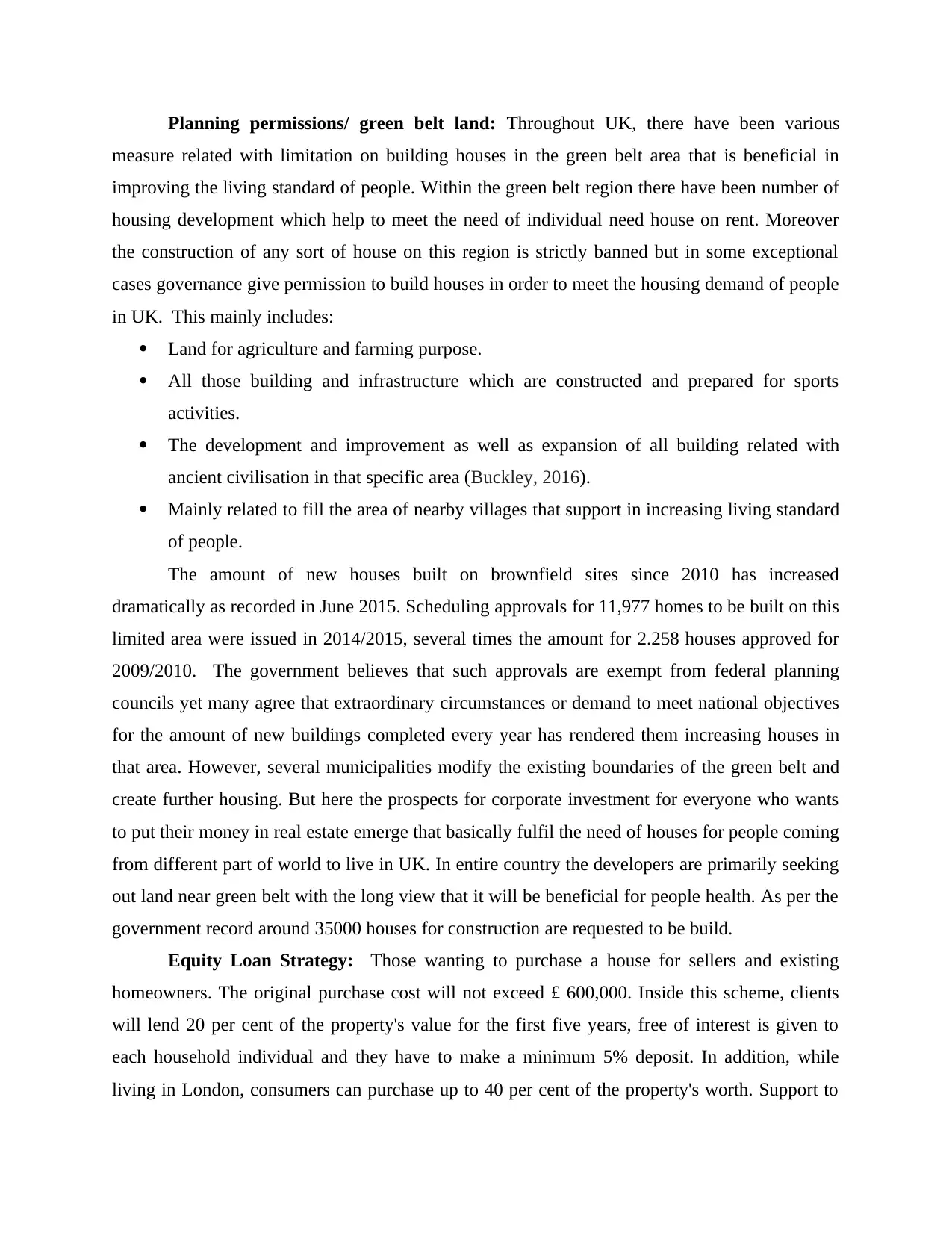
Planning permissions/ green belt land: Throughout UK, there have been various
measure related with limitation on building houses in the green belt area that is beneficial in
improving the living standard of people. Within the green belt region there have been number of
housing development which help to meet the need of individual need house on rent. Moreover
the construction of any sort of house on this region is strictly banned but in some exceptional
cases governance give permission to build houses in order to meet the housing demand of people
in UK. This mainly includes:
Land for agriculture and farming purpose.
All those building and infrastructure which are constructed and prepared for sports
activities.
The development and improvement as well as expansion of all building related with
ancient civilisation in that specific area (Buckley, 2016).
Mainly related to fill the area of nearby villages that support in increasing living standard
of people.
The amount of new houses built on brownfield sites since 2010 has increased
dramatically as recorded in June 2015. Scheduling approvals for 11,977 homes to be built on this
limited area were issued in 2014/2015, several times the amount for 2.258 houses approved for
2009/2010. The government believes that such approvals are exempt from federal planning
councils yet many agree that extraordinary circumstances or demand to meet national objectives
for the amount of new buildings completed every year has rendered them increasing houses in
that area. However, several municipalities modify the existing boundaries of the green belt and
create further housing. But here the prospects for corporate investment for everyone who wants
to put their money in real estate emerge that basically fulfil the need of houses for people coming
from different part of world to live in UK. In entire country the developers are primarily seeking
out land near green belt with the long view that it will be beneficial for people health. As per the
government record around 35000 houses for construction are requested to be build.
Equity Loan Strategy: Those wanting to purchase a house for sellers and existing
homeowners. The original purchase cost will not exceed £ 600,000. Inside this scheme, clients
will lend 20 per cent of the property's value for the first five years, free of interest is given to
each household individual and they have to make a minimum 5% deposit. In addition, while
living in London, consumers can purchase up to 40 per cent of the property's worth. Support to
measure related with limitation on building houses in the green belt area that is beneficial in
improving the living standard of people. Within the green belt region there have been number of
housing development which help to meet the need of individual need house on rent. Moreover
the construction of any sort of house on this region is strictly banned but in some exceptional
cases governance give permission to build houses in order to meet the housing demand of people
in UK. This mainly includes:
Land for agriculture and farming purpose.
All those building and infrastructure which are constructed and prepared for sports
activities.
The development and improvement as well as expansion of all building related with
ancient civilisation in that specific area (Buckley, 2016).
Mainly related to fill the area of nearby villages that support in increasing living standard
of people.
The amount of new houses built on brownfield sites since 2010 has increased
dramatically as recorded in June 2015. Scheduling approvals for 11,977 homes to be built on this
limited area were issued in 2014/2015, several times the amount for 2.258 houses approved for
2009/2010. The government believes that such approvals are exempt from federal planning
councils yet many agree that extraordinary circumstances or demand to meet national objectives
for the amount of new buildings completed every year has rendered them increasing houses in
that area. However, several municipalities modify the existing boundaries of the green belt and
create further housing. But here the prospects for corporate investment for everyone who wants
to put their money in real estate emerge that basically fulfil the need of houses for people coming
from different part of world to live in UK. In entire country the developers are primarily seeking
out land near green belt with the long view that it will be beneficial for people health. As per the
government record around 35000 houses for construction are requested to be build.
Equity Loan Strategy: Those wanting to purchase a house for sellers and existing
homeowners. The original purchase cost will not exceed £ 600,000. Inside this scheme, clients
will lend 20 per cent of the property's value for the first five years, free of interest is given to
each household individual and they have to make a minimum 5% deposit. In addition, while
living in London, consumers can purchase up to 40 per cent of the property's worth. Support to
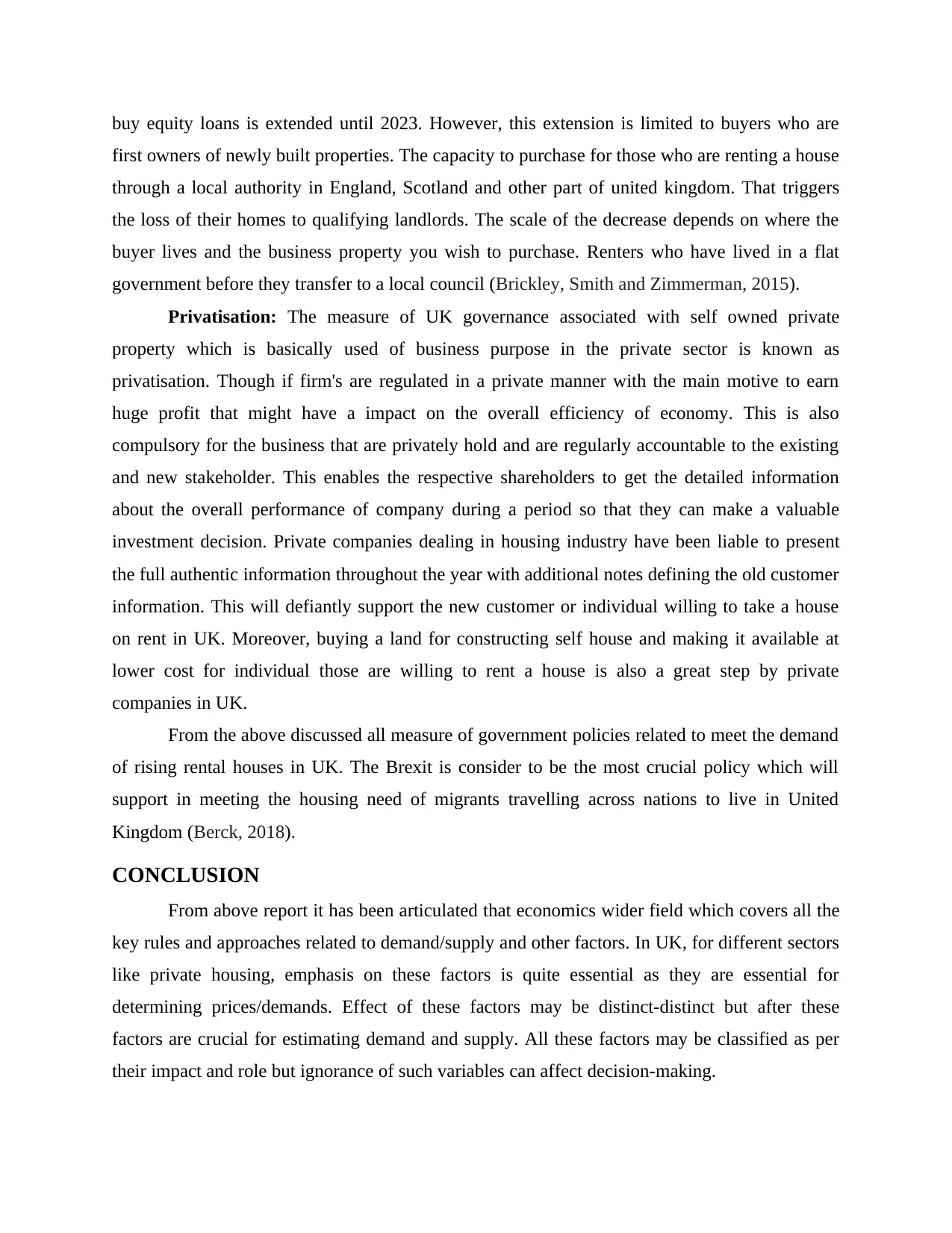
buy equity loans is extended until 2023. However, this extension is limited to buyers who are
first owners of newly built properties. The capacity to purchase for those who are renting a house
through a local authority in England, Scotland and other part of united kingdom. That triggers
the loss of their homes to qualifying landlords. The scale of the decrease depends on where the
buyer lives and the business property you wish to purchase. Renters who have lived in a flat
government before they transfer to a local council (Brickley, Smith and Zimmerman, 2015).
Privatisation: The measure of UK governance associated with self owned private
property which is basically used of business purpose in the private sector is known as
privatisation. Though if firm's are regulated in a private manner with the main motive to earn
huge profit that might have a impact on the overall efficiency of economy. This is also
compulsory for the business that are privately hold and are regularly accountable to the existing
and new stakeholder. This enables the respective shareholders to get the detailed information
about the overall performance of company during a period so that they can make a valuable
investment decision. Private companies dealing in housing industry have been liable to present
the full authentic information throughout the year with additional notes defining the old customer
information. This will defiantly support the new customer or individual willing to take a house
on rent in UK. Moreover, buying a land for constructing self house and making it available at
lower cost for individual those are willing to rent a house is also a great step by private
companies in UK.
From the above discussed all measure of government policies related to meet the demand
of rising rental houses in UK. The Brexit is consider to be the most crucial policy which will
support in meeting the housing need of migrants travelling across nations to live in United
Kingdom (Berck, 2018).
CONCLUSION
From above report it has been articulated that economics wider field which covers all the
key rules and approaches related to demand/supply and other factors. In UK, for different sectors
like private housing, emphasis on these factors is quite essential as they are essential for
determining prices/demands. Effect of these factors may be distinct-distinct but after these
factors are crucial for estimating demand and supply. All these factors may be classified as per
their impact and role but ignorance of such variables can affect decision-making.
first owners of newly built properties. The capacity to purchase for those who are renting a house
through a local authority in England, Scotland and other part of united kingdom. That triggers
the loss of their homes to qualifying landlords. The scale of the decrease depends on where the
buyer lives and the business property you wish to purchase. Renters who have lived in a flat
government before they transfer to a local council (Brickley, Smith and Zimmerman, 2015).
Privatisation: The measure of UK governance associated with self owned private
property which is basically used of business purpose in the private sector is known as
privatisation. Though if firm's are regulated in a private manner with the main motive to earn
huge profit that might have a impact on the overall efficiency of economy. This is also
compulsory for the business that are privately hold and are regularly accountable to the existing
and new stakeholder. This enables the respective shareholders to get the detailed information
about the overall performance of company during a period so that they can make a valuable
investment decision. Private companies dealing in housing industry have been liable to present
the full authentic information throughout the year with additional notes defining the old customer
information. This will defiantly support the new customer or individual willing to take a house
on rent in UK. Moreover, buying a land for constructing self house and making it available at
lower cost for individual those are willing to rent a house is also a great step by private
companies in UK.
From the above discussed all measure of government policies related to meet the demand
of rising rental houses in UK. The Brexit is consider to be the most crucial policy which will
support in meeting the housing need of migrants travelling across nations to live in United
Kingdom (Berck, 2018).
CONCLUSION
From above report it has been articulated that economics wider field which covers all the
key rules and approaches related to demand/supply and other factors. In UK, for different sectors
like private housing, emphasis on these factors is quite essential as they are essential for
determining prices/demands. Effect of these factors may be distinct-distinct but after these
factors are crucial for estimating demand and supply. All these factors may be classified as per
their impact and role but ignorance of such variables can affect decision-making.
⊘ This is a preview!⊘
Do you want full access?
Subscribe today to unlock all pages.

Trusted by 1+ million students worldwide
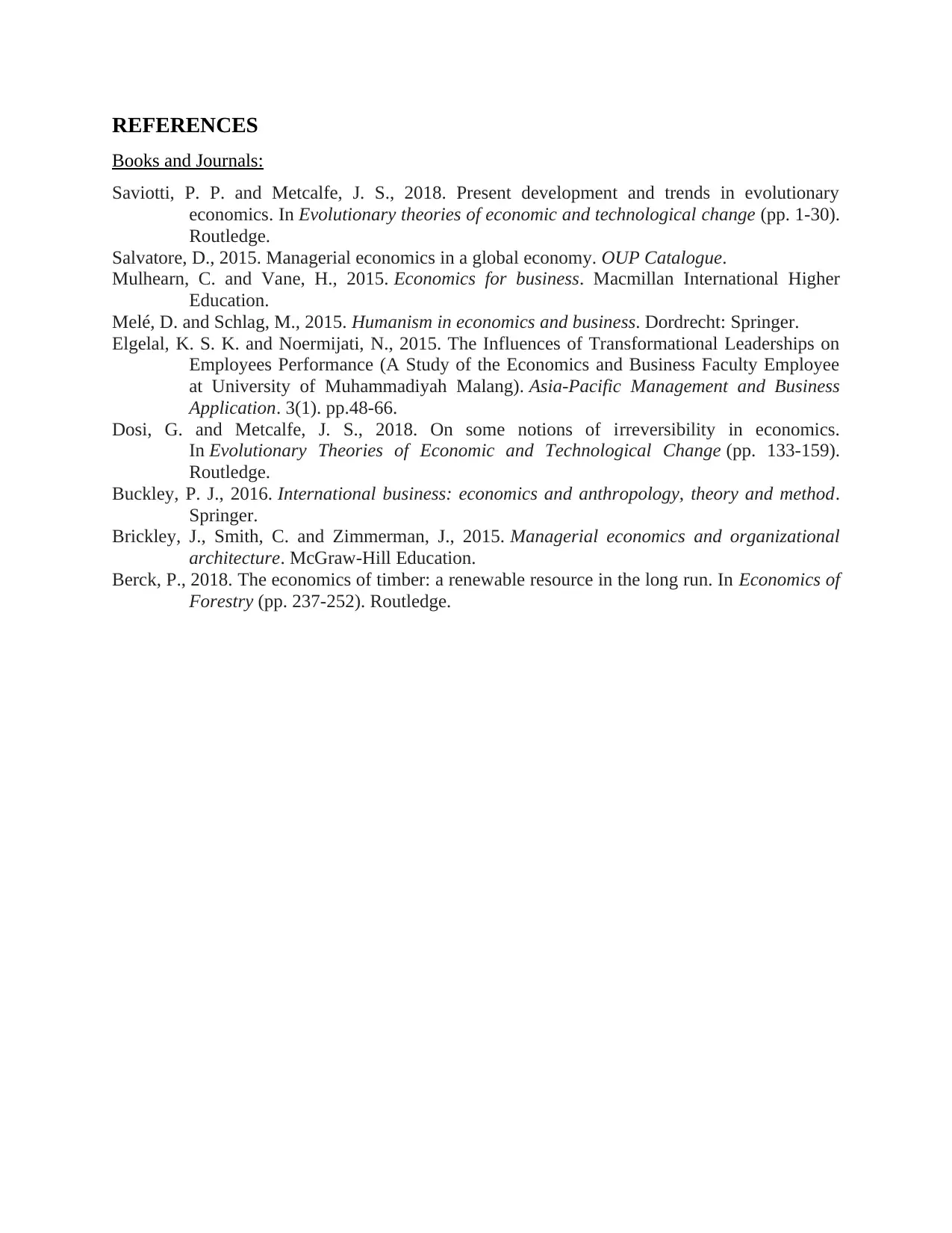
REFERENCES
Books and Journals:
Saviotti, P. P. and Metcalfe, J. S., 2018. Present development and trends in evolutionary
economics. In Evolutionary theories of economic and technological change (pp. 1-30).
Routledge.
Salvatore, D., 2015. Managerial economics in a global economy. OUP Catalogue.
Mulhearn, C. and Vane, H., 2015. Economics for business. Macmillan International Higher
Education.
Melé, D. and Schlag, M., 2015. Humanism in economics and business. Dordrecht: Springer.
Elgelal, K. S. K. and Noermijati, N., 2015. The Influences of Transformational Leaderships on
Employees Performance (A Study of the Economics and Business Faculty Employee
at University of Muhammadiyah Malang). Asia-Pacific Management and Business
Application. 3(1). pp.48-66.
Dosi, G. and Metcalfe, J. S., 2018. On some notions of irreversibility in economics.
In Evolutionary Theories of Economic and Technological Change (pp. 133-159).
Routledge.
Buckley, P. J., 2016. International business: economics and anthropology, theory and method.
Springer.
Brickley, J., Smith, C. and Zimmerman, J., 2015. Managerial economics and organizational
architecture. McGraw-Hill Education.
Berck, P., 2018. The economics of timber: a renewable resource in the long run. In Economics of
Forestry (pp. 237-252). Routledge.
Books and Journals:
Saviotti, P. P. and Metcalfe, J. S., 2018. Present development and trends in evolutionary
economics. In Evolutionary theories of economic and technological change (pp. 1-30).
Routledge.
Salvatore, D., 2015. Managerial economics in a global economy. OUP Catalogue.
Mulhearn, C. and Vane, H., 2015. Economics for business. Macmillan International Higher
Education.
Melé, D. and Schlag, M., 2015. Humanism in economics and business. Dordrecht: Springer.
Elgelal, K. S. K. and Noermijati, N., 2015. The Influences of Transformational Leaderships on
Employees Performance (A Study of the Economics and Business Faculty Employee
at University of Muhammadiyah Malang). Asia-Pacific Management and Business
Application. 3(1). pp.48-66.
Dosi, G. and Metcalfe, J. S., 2018. On some notions of irreversibility in economics.
In Evolutionary Theories of Economic and Technological Change (pp. 133-159).
Routledge.
Buckley, P. J., 2016. International business: economics and anthropology, theory and method.
Springer.
Brickley, J., Smith, C. and Zimmerman, J., 2015. Managerial economics and organizational
architecture. McGraw-Hill Education.
Berck, P., 2018. The economics of timber: a renewable resource in the long run. In Economics of
Forestry (pp. 237-252). Routledge.
1 out of 10
Related Documents
Your All-in-One AI-Powered Toolkit for Academic Success.
+13062052269
info@desklib.com
Available 24*7 on WhatsApp / Email
![[object Object]](/_next/static/media/star-bottom.7253800d.svg)
Unlock your academic potential
Copyright © 2020–2026 A2Z Services. All Rights Reserved. Developed and managed by ZUCOL.




